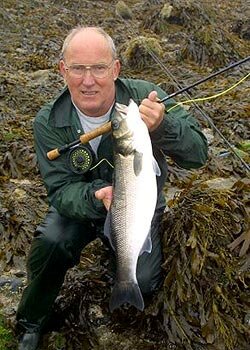I am a sea angler. I am in this film – fishing for bass on the Blackwater estuary in Essex – and took part in it because I share the view that modern fishing technology in the hands of a few people is destroying the value of the sea for millions of citizens.

Bob Cox with a bass he caught
That is how it is in Europe, anyway.
In England, we fondly talk about the USA as being just the other side of the pond but as far as fisheries management is concerned, it may as well be the other side of the galaxy.
In the USA, recreational sea angling is recognised as a legitimate use of many species of fin fish. There, fish that are of great importance to sport fishermen are managed so that anglers get the major share of the allowable harvest.
On the East Coast for example 90 per cent of the striped bass are allocated to recreational fishermen; commercial fishermen get what’s left.
Here in Europe our bass, now re-branded by smart restaurants as “sea bass”, were until the last 30 years almost exclusively “the angler’s fish,” held in the highest esteem by all who fished for them with rod and line.
Bass rods, bass lures and bass boats were all produced in pursuit of the bass.
Then came climate change, here in N W Europe it kicked in round about 1989 when warmer spring and winter seas allowed millions of bass fry to survive and throughout the 1990s bass production trebled.
This should have been good news for sea anglers but by then the commercial fleet aided and abetted by Government and the EU’s Common Fisheries Policy had already reduced the most important commercially fished species, such as cod, haddock and plaice to a tiny fraction of their original abundance.
With nothing much left to fish for, they turned their massive, efficient catching machines on bass.
The results have been a disaster for sea anglers – who in Britain number more than a million people, compared with the commercial sector which is now less than 12,000.
We still have above average number of bass fry surviving to become young fish but the older and therefore bigger, more exiting fish are rare. The commercials are taking the bulk of the fish whilst still immature, at age 5-6, about a pound and a half in weight.
Sea anglers need fish of five pounds plus (aged 10-12) to prosper, with a realistic chance of the magic ‘double figure’ bass (over 10 lbs). They can grow to 20lbs.
Though anglers have protested these points at both national and EU level they have done nothing more than highlight their catches. They have now been threatened by the EU with quotas for recreational fishing boats with no benefits coming the other way!
So why is there such difference in attitudes and values between Europe and the USA? I believe it is cultural. Here in Europe and certainly in the UK, someone owns everything. Since William Duke of Normandy (1066 and all that) carved up Britain and gave it to his barons, every last patch of land and all the creatures that live on or in it, belong to someone.
If you wish to walk on or “hunt” over their land, you either need their permission or pay them for the privilege. The notion that anything belonged to the people is just not in our culture.
This attitude has now spread to the last freedom we have, the right to go down to the sea and catch fish. The fact that sea fish are, according to the UN, the property and heritage of the people, is ignored and ownership of sea fish was assumed by the commercial fishing industry when the UK government handed out free of charge, licenses to every commercial fishing boat that had a track record of catching and selling fish.
In the USA there still appears to be something of a frontier attitude to hunting and fishing. It is still deemed right that that every American should be free to put food on the table of family and friends by hunting and fishing.
Sure, there are sensible rules to follow, to ensure that stocks are kept healthy but people hunt and fish with the sure knowledge that their prey is their as of right.
The same is not true here in the UK, I have even listened to the proprietors of fishing tackle shops complain about the lack of fish and therefore lack of trade, then in the next sentence endorse what the commercials are doing by proclaiming “Oh well I suppose they have to make a living”, seemingly oblivious to the demise of his own livelihood.
The notion that sea angling as the face of “public ownership” of our marine fishery resources has a superior claim on those resources to those who exploit them commercially for profit, never occurred to him, it’s all in the culture.
![]()



Dear Bob
Great Blog - thank you for everything you are doing. yrs Bernard
You would hope that now the credit crunch has hit out financial system and free market values are suddenly out of fashion that people would better understand nothing is forever and all resources require regulation for the public interest, especially our natural resources.
We haven’t quite had out ecological credit crunch yet but it will come and I fear it will be far more dramatic and government “bail out’s” wont be an option.